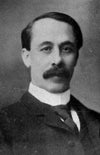
Lawrence J. Corbly replaced Thomas E. Hodges in 1896. A description of the Marshall College at that time indicated the challenges the new principal faced: “Marshall was little more than an advanced high school, the student body for the most part comprising young men and women from Huntington and vicinity. The enrollment, including the faculty, totaled less than one hundred.” Although named a college, it could not grant baccalaureate degrees, only issuing normal school teaching diplomas. Corbly sought to make it a college in more than name only, writing in 1911 that he would be “very happy to see this school converted into a degree-conferring college.” He reorganized the College’s departments, adding courses, lengthening the time to receive a diploma, and increasing the faculty. When he took over there were only nine faculty members, and by 1907 the faculty had increased to twenty-seven. The student enrollment grew as offerings increased, quadrupling in size during Corbly’s tenure.
In 1907 an ambitious plan was approved by the state that looked toward the time when the College would be allowed to offer degrees. As part of the plan, Corbly’s title was changed from “Principal” to “President” and the faculty received the commensurate title of “Professor,” replacing “Teacher.” During the remaining years of his tenure, Corbly continually sought to upgrade the school, but when he left in 1915, his desire to see the school become a degree-granting institution remained unfulfilled.
Lawrence J. Corbly was born on September 19, 1862, the son of Andre Lynn Corbly and Miranda (Moore) Corbly, on a farm near Alma, Tyler County, West Virginia. He was the sixth of eleven children. His early life was spent on the family farm, while he attended local public schools. He completed the normal course at Fairmont State School Normal (now Fairmont State University) in 1884, at the age of twenty-two. He joined the law of offices of W. I. Boreman, in order to read for the law, but before taking the bar examination, he entered West Virginia University, graduating with a bachelor of arts degree in 1890. He felt “that to be a well-trained lawyer one should have university training.” His experience in obtaining a bachelors of arts in the classics, dissuaded him from the practice of law and he turned to teaching instead, “his eminent fitness for this profession having thus far prevented his giving attention to the law.”
After his graduation, he moved to the South to take a position as superintendent of schools at Water Valley, Mississippi, serving from 1890-1892. He returned to West Virginia, taking a similar position, as the principal of Clarksburg Graded Schools, where he remained until 1895. He completed all the course work for a Ph.D. at West Virginia University. During 1895-1896 he traveled to Europe to study languages at universities in Halle, Jena and Berlin. While at Berlin he received a message, calling him back to West Virginia to accept a new position as the principal of Marshall College. He took over the new position, leaving his Ph.D. uncompleted. This began his nineteen-year association with the College as its Principal. He resigned in 1915 to pursue a business career in real estate.
In 1925 he returned to the College as a faculty member of the German Department, becoming the department chairman. He continued to teach, even teaching courses in astronomy, “a subject with which he was well acquainted.” During these years he “faithfully and efficiently fulfilled his professorial duties at the college, excelling as a teacher of science, the languages and the Bible.” In 1887 he met Elizabeth “Lizzie” Holland of New Cumberland, while competing for a scholarship examination to the Peabody College at Nashville. When they tied for the scholarship, he graciously bowed out and let her have the scholarship. A romance ensued, and they were married on December 23, 1887, at Belmont, Ohio. The couple had no children. His wife died in 1906. He then married Sydney Thomas of New Haven, Connecticut, on December 24, 1907. The couple had no children. She survived him.
Corbly died suddenly on October 20, 1935, while at home from a heart attack. That morning he had preached a sermon at the Central Christian Church, substituting for Dr. W. H. Shaffer who was out of town; he was also scheduled to deliver the evening sermon. His funeral services were held in the Old Main auditorium, where he laid in state. He is buried in the Corbly mausoleum in Spring Hill Cemetery.
Principals
- Isaac N. Peck, 1837-1839
- Jacob H. Patton, 1839- 1840
- Alfred E. Thom, 1840-1843
- Josiah B. Poage, 1843-1850
- Henry Clark and Joseph Foster, 1850
- William B. McFarland, 1850-1853
- Staunton V. Field, 1853-1854
- William R. Boyers, 1854-1858
- Benjamin H. Thackston, 1858-1861
- Rev. J. M. Brown, 1861
- Daniel W. Thrush, 1861
- Salina C. Hite Mason, 1863-1867
Presidents
- Stewart Harold Smith, 1961-1968
- Roland Hill Nelson, Jr., 1968-1970
- Donald Newton Dedmon, 1970-1971
- John Grove Barker, 1971-1974
- Robert Bruce Hayes, 1974-1983
- Sam Edward Clagg, 1984
- Dale Frederick Nitzschke, 1984-1990
- Alan Brant Gould, 1990-1991
- James Wade Gilley, 1991-1999
- Audy Michael Perry, 1999-2000
- Daniel Duane Angel, 2000-2005
- Michael Joseph Ferrell, 2005
- Stephen James Kopp, 2005 – 2014
- Gary G. White, 2014 – Jan 2016
- Jerome A “Jerry” Gilbert, 2016 – present
Bibliography With Source Notes
Created by Lisle Brown, former Curator Special Collections
Exhibits By Category
CONTACT
- Special Collections, Morrow Library, Marshall University, One John Marshall Drive, Huntington, WV 25755
- speccoll@marshall.edu
- 304-696-2343 telephone
- 304-696-2361 fax (800) 818-9816 toll free
OTHER RESOURCES
- Staff/Faculty
- Directions
- Research & Duplication Fees
- Regular Hours: Mon – Fri: 8 am – 4:30 pm; Sat – Sun: closed
- Contribute to Lisle Brown Memorial Fund